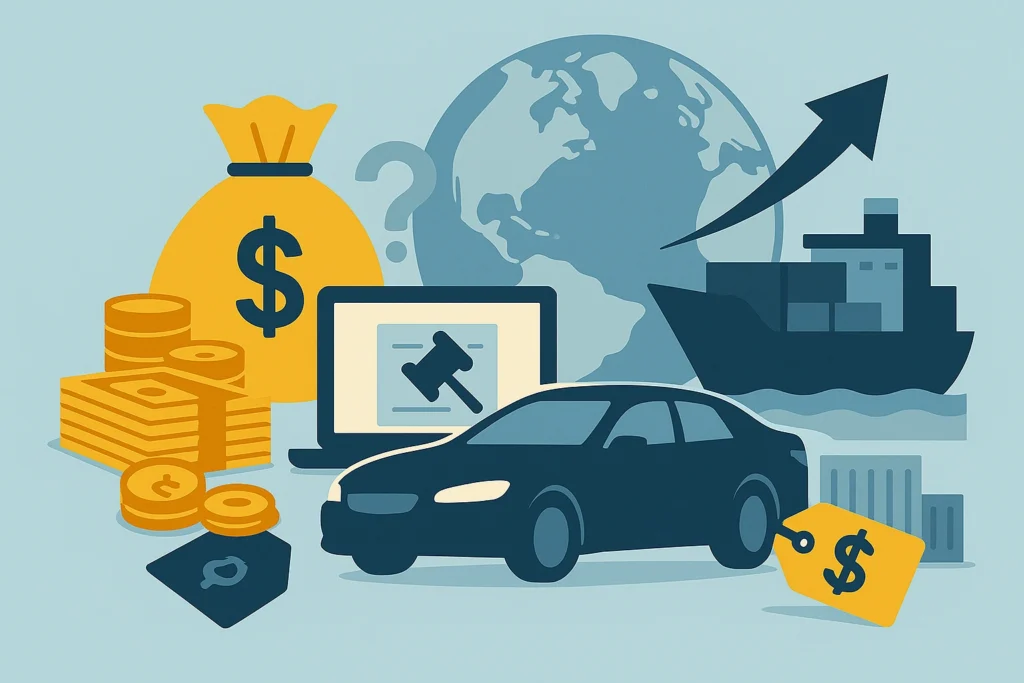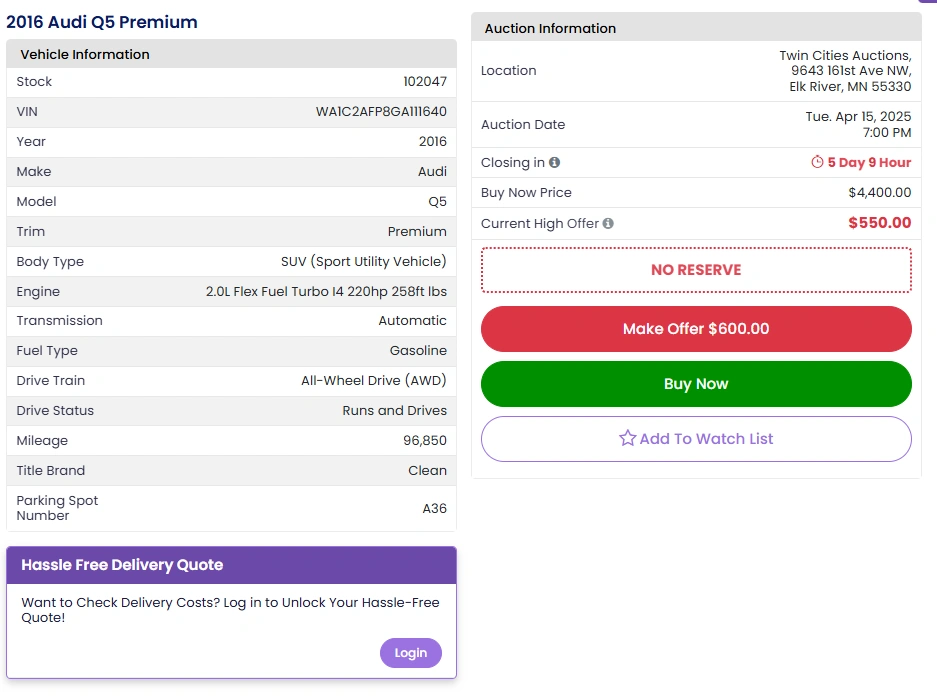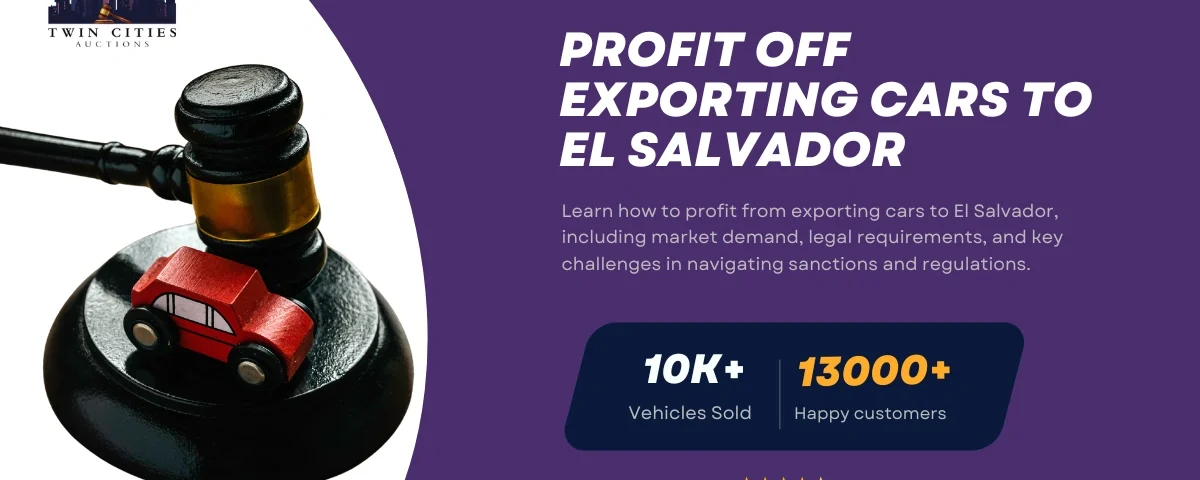In 2023, El Salvador imported $162 million in passenger cars under HS code 8703—a 7 % increase from 2022—according to UN Comtrade. The average CIF import price was $8 450 per vehicle, per IndexBox.
With limited domestic production and rising urbanization in San Salvador and Santa Ana, demand for reliable, late-model imports continues to grow. U.S. exporters who master the region’s customs framework, cost breakdown, and logistics stand to capture premium margins.

Key Takeaways
- El Salvador imported $162 M in cars in 2023, up 7 % from 2022
- Avg. CIF price per unit: $8 450
- Required docs: Commercial Invoice; Customs Declaration; Bill of Lading; Certificate of Conformity (CAUCA); Emission Test Report
- Levies: Import Duty 20 %; VAT 13 %; ICE up to 30 % on CIF+Duty
- Build precise landed-cost models to secure 10–15 % margins
- Gateways: Port of Acajutla & Port La Unión
Understanding the El Salvador Market
El Salvador’s auto market is highly reliant on used vehicle imports due to limited local production, making it an attractive destination for U.S. exporters.
Economic recovery and urbanization have fueled demand for smaller, fuel-efficient vehicles that suit city driving. Increasing access to credit and the rise of ride-hailing apps are also pushing younger buyers toward late-model sedans and compact SUVs.
Exporters targeting this market will benefit from understanding buyer preferences for practicality, low maintenance, and modern safety features.
| Year | Import Value (USD M) | % Change vs Prior Year |
| 2022 | 151 M | — |
| 2023 | 162 M | + 7 % |
| Metric | Figure |
| Avg. CIF Price per Vehicle | $8 450 per unit |
Consumer Preferences
- Affordability: Vehicles under $15 000 dominate, reflecting budget constraints.
- Fuel Economy: Sub-1.6 L engines favored for urban driving costs.
- Safety & Features: Late-model imports with ABS, airbags, and climate control command premiums.
Regulations & Compliance
El Salvador implements the Central American Uniform Customs Code (CAUCA) and local environmental rules. HS 8703 vehicles require:
| Document | Purpose |
| Commercial Invoice | Declares sale price, buyer/seller details |
| Customs Declaration | Formal import entry, duty & tax assessment |
| Bill of Lading | Legal proof of sea or air shipment |
| Certificate of Conformity (CAUCA) | Verifies compliance with Central American technical norms |
| Emission Test Report | Confirms adherence to local environmental standards |
Source: U.S. Commercial Guide, El Salvador Import Requirements
Key Compliance Points
- CAUCA CoC: Issued by authorized laboratories, mandatory before customs entry.
- Emission Testing: Local MOT centers check CO₂, NOₓ limits per NT 233:2013.
- Document Translations: All documents must be in Spanish or accompanied by certified translations.
Tariffs & Taxes
El Salvador’s tax system applies multiple layers of duties to vehicle imports, significantly increasing the total cost. Importers need to understand that VAT and the Selective Consumption Tax (ICE) are calculated on top of the import duty, leading to a compounding effect.
Larger engine sizes attract higher ICE rates, making high-displacement vehicles less cost-effective. Strategic planning around engine specs and declared values can help reduce the overall tax burden.
| Levy | Rate | Base Calculation |
| Import Duty | 20 % | CIF |
| Value-Added Tax (VAT) | 13 % | CIF + Import Duty |
| Selective Consumption Tax (ICE) | 0–30 % | CIF + Import Duty (varies by engine cc) |
Source: El Salvador Tax Authority
Duty Triggers
- ICE tops out at 30 % for engines > 2 L; lower rates for smaller displacements.
- VAT at 13 % funds social programs; non-payment blocks registration.
Crafting Your Landed-Cost Model
To secure target margins, layer each charge onto your CIF:
| Component | Calculation Basis |
| CIF Cost | FOB Price + Freight & Insurance |
| Import Duty (20 %) | 0.20 × CIF |
| VAT (13 %) | 0.13 × (CIF + Import Duty) |
| ICE (up to 30 %) | Rate (%) × (CIF + Import Duty) |
| Total Landed Cost | Sum of above |
Then add your 10–15 % markup to account for FX swings, handling, and resale overhead.
Main Shipping Gateways
The Port of Acajutla serves as El Salvador’s primary entry point for vehicle imports, offering both container and Ro-Ro capabilities.
Its proximity to key road networks makes it a preferred option for fast inland distribution. For bulk or high-volume shipments, Port La Unión is gaining traction as an efficient alternative with less congestion.
Understanding which port best suits your shipping volume and timelines is key to minimizing delays and port storage fees.
- Port of Acajutla: Pacific coast’s principal container & Ro-Ro terminal, handling > 15 000 TEU/year.
- Port La Unión: Deep-water facility reducing Mombasa-like congestion; ideal for larger volumes.
Common Pitfalls to Avoid
Many exporters face avoidable delays due to incomplete or outdated documentation. Emission testing reports must be current and issued by recognized centers—expired documents will immediately halt customs clearance.
ICE tax miscalculations are another common error, especially if engine sizes are incorrectly declared or if outdated rates are used.
Always confirm compliance with the most recent local regulations and ensure the CAUCA Certificate of Conformity is valid and from an approved source.
| Common Pitfall | Description |
|---|---|
| Mis-calculating ICE | Engine-cc brackets change annually—always verify the current tax schedule. |
| Skipping Emission Tests | Missing or expired emission reports will result in customs entry rejection. |
| Incomplete CAUCA CoC | Certificates from non-standard labs or expired documents can lead to fines. |
| Ignoring Import Declaration Form | Failure to submit the K601 import declaration form will halt the clearance process. |
Why Auctions Are a Smart Choice for Car Purchases
Auctions can be an excellent source for late-model vehicles with clear chains of title and affordable pricing. Twin Cities Auctions, based in Minnesota, is one such reputable auction house that offers a wide range of vehicles at competitive prices.
Key Benefits of Buying from Auctions:
- Wide Selection: Auctions like Twin Cities Auctions offer a variety of vehicles, from low-budget cars to high-end models.

- Competitive Pricing: Auctions often offer vehicles at prices below retail value, enabling dealers to maximize their profit margins.

- Transparency: Auctions provide full vehicle history reports, so you know exactly what you’re buying.

- Convenient Bidding: Many auctions offer online bidding for your convenience, making it easier to source vehicles without being physically present.
Twin Cities Auctions: A Smart Vehicle Sourcing Choice
For those in the automotive industry, Twin Cities Auctions offers an excellent platform for sourcing quality vehicles at competitive prices.
Whether you are just starting or expanding your business, this auction house provides transparency, competitive pricing, and a broad selection.
| Feature | Description |
| Inventory Variety | Wide range of cars, trucks, and SUVs available |
| Competitive Pricing | Below-market pricing allows for higher profit margins |
| Vehicle History Reports | Detailed history reports for every vehicle |
| Online Bidding | Convenient online bidding options for dealers |
| Financing Options | Financing available to help with inventory purchases |
Conclusion
Exporting cars to El Salvador demands rigor in compliance, precise cost modeling, and efficient routing through Acajutla or La Unión. Leveraging U.S. auctions—such as Twin Cities Auctions—provides vetted supply and clear titles, ensuring you c apture the market’s growing demand with confidence and prof itable consistency.
Ready to Buy or Sell Your Car? No Dealer License Needed!
At Twin Cities Auctions, we simplify the process of buying and selling vehicles, making it straightforward and hassle-free. You don’t need a dealer license to participate—our online platform is open to the public, accommodating both first-time buyers and seasoned sellers.
Whether you’re upgrading your ride or selling your current vehicle, we provide the platform you need that offers a diverse range of vehicles and a transparent bidding process. Start your auction journey with us today!
Looking for more options? Explore our comprehensive list of all available car auctions across the United States. Your next deal might be just a click away!
FAQ
What are El Salvador’s auto import duties?
Import Duty 20 % on CIF; VAT 13 % on (CIF + Duty); ICE up to 30 % by engine size.
Can I export used cars to El Salvador?
Yes—vehicles of any age qualify, provided they pass CAUCA CoC and emission tests.
How long does clearance take?
Typically 3–5 business days once all compliant docs are submitted.
Are there engine-size restrictions?
No bans, but ICE rates increase with engine capacity.
How do I handle rejected shipments?
Work with your customs broker to correct issues; budget for storage and retesting.
Source Links
https://www.indexbox.io/search/passenger-car-price-el-salvador
https://legacy.export.gov/article?id=El-Salvador-Import-Requirements-and-Documentation


